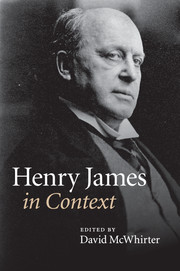Book contents
- Frontmatter
- Contents
- List of Illustrations
- Notes on Contributors
- Preface
- Abbreviations
- Chronology
- Part One Life and career, times and places
- Chapter 1 Nineteenth-century America (1843–1870)
- Chapter 2 Nineteenth-century Europe (1843–1900)
- Chapter 3 Victorian England (1870–1890)
- Chapter 4 Fin-de-siècle London (1890–1900)
- Chapter 5 The twentieth-century world (1901–1916)
- Chapter 6 Autobiographies and biographies
- Chapter 7 Letters and notebooks
- Chapter 8 The James family
- Part Two Historical and cultural contexts
- Part Three Reception
- Further reading
- Index
- References
Chapter 5 - The twentieth-century world (1901–1916)
Published online by Cambridge University Press: 05 August 2014
- Frontmatter
- Contents
- List of Illustrations
- Notes on Contributors
- Preface
- Abbreviations
- Chronology
- Part One Life and career, times and places
- Chapter 1 Nineteenth-century America (1843–1870)
- Chapter 2 Nineteenth-century Europe (1843–1900)
- Chapter 3 Victorian England (1870–1890)
- Chapter 4 Fin-de-siècle London (1890–1900)
- Chapter 5 The twentieth-century world (1901–1916)
- Chapter 6 Autobiographies and biographies
- Chapter 7 Letters and notebooks
- Chapter 8 The James family
- Part Two Historical and cultural contexts
- Part Three Reception
- Further reading
- Index
- References
Summary
When exactly did the twentieth century begin in the minds of those waiting for the clocks to strike at midnight? If one followed the Gregorian calendar, 1 January 1900 marked entry into an entirely different era of modern life. The applied sciences had other views, as when the Royal Observatory at Greenwich threw its weight on to the argument that 1 January 1901 would be the true start of the millennium. In retrospect, historians might cite Queen Victoria’s death on 22 January 1901 as the moment that tipped the old into the new. Early in 1900 Henry James shaved off his beard, signifying his ‘effort to be young again, and to be something he had never been’. This simple act was James’s ‘birth into modernity, the visible expression of putting the Victorian world behind him’.
Symbolic acts are accompanied by actualities, in James’s case the ups and down that followed in the months ahead. In October 1900 he informed his brother William that ‘the excellently effective [James B.] Pinker’, to whom he had entrusted his dealings with publishers, ‘is bringing me up, and round, so promisingly that it really contains the germs of a New Career’ (HJL-4, 167). The next day, however, James admitted to Morton Fullerton his belief that he was ‘face to face, at my age, with every successive lost opportunity . . . what doesn’t come doesn’t, and what goes does’ (HJL-4, 169). How apt that these sentiments merge with the fact that James was just then working on his treatment of Lambert Strether for The Ambassadors. As he had remarked on 15 May, acts of authorship were gravely hampered by the continuing conflict with the Boers, an ‘interminable war [that] keeps everything back’ (HJL-4, 141). Yet, he retained his ability to convert interludes of sadness and doubt into vital art. James was both inspired and thwarted by the terrible, fascinating demands of the new century. On 1 January 1900 he had been loath to welcome ‘This dreadful gruesome New Year, so monstrously numbered, [which] makes me turn back to the warm and coloured past and away from the big black avenue that gapes in front of us’ (HJL-4, 128). Over the next sixteen years he would often look back upon that ‘warm and coloured past’, but never in lieu of his efforts to confront modernity head-on.
- Type
- Chapter
- Information
- Henry James in Context , pp. 47 - 57Publisher: Cambridge University PressPrint publication year: 2010

